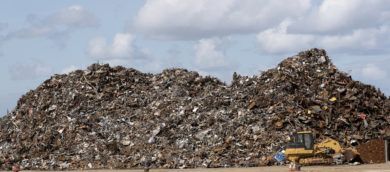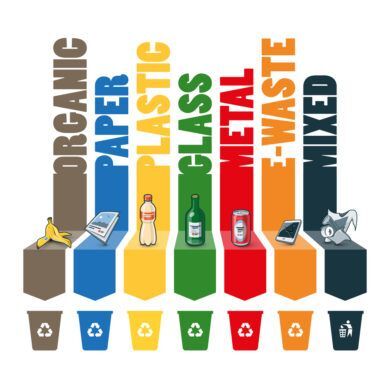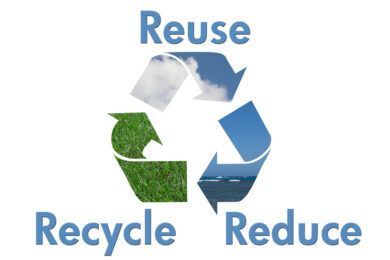What happens when the largest buyer of recycled consumer waste decides that it no longer wants to be the recipient of the world’s trash? That is the question facing municipalities and recycling companies in the U.S., Europe, Japan, and Australia.
In a dramatic move last April, the city of Ipswich in Queensland, Australia decided to put an end to its curbside recycling program. The reason behind this decision? The implementation of China’s National Sword program.
China’s Making Big Changes
China, the world’s most populous country has been the largest importer of recyclable materials, taking in more than 30 million metric tons of waste annually from all over the world. But in July of 2017, China instituted what it called the Green Fence and decided to restrict the amount of garbage entering the country.
In a second step, as of Jan. 1, China is now enforcing its new “National Sword” policy, which bans 24 types of solid waste, including plastic codes 3 through 7, unsorted mixed papers, and sets a much tougher standard for contamination levels.
According to Ipswich city officials, the increased scrutiny of accepting only clean recyclable material and the rising level of contaminated of non-recyclable rubbish being placed in the curbside recycling bins have increased the effective cost to recycle waste by 400 to 500 percent.
The result: It has become too costly for the city to recycle.
How Are Australian Communities Dealing?
So far, Queensland’s other major communities — Brisbane, Logan, and the Gold Coast — have ruled out following suit, but the big question is, will other communities in Australia and around the world follow Ipswich’s lead? And, if they do, what sort of community blowback can be expected.
The Ipswich City Council decision took many government officials and its citizens by surprise, and many are calling it a “backward step” that is setting a “dangerous benchmark.”
Over the past 20 years, according to Forbes, the majority of the western world has made great strides in increasing the amount of waste that is redirected to recycling plants or being composted. Germany is the most efficient at 65 percent while Japan falls in the 19 percent range and the U.S. is in the middle at 35 percent. Much of the improvement has been through the adoption of single stream recycling and the improvement of automated sorting at the receiving end. Equipment such as the General Kinematics MULTI-STREAM™ Recycling Equipment, Glass / Fiberglass Recycling Solutions, and Municipal Solid Waste (MSW) Sorting Solutions, are making the sorting of recyclables easier and more efficient.
However, all of that efficiency is wasted if the recyclables are not actually recycled. According to PRI’s The World, mountains of US recycling are piling up on U.S. docks as China tightens its restrictions on imports.
Rippling Effects Throughout the World
Like Ipswich, the National Sword is being felt throughout the U.S. as well. For instance, at E.L. Harvey & Sons outside of Boston, between 150 and 200 tractor trailer loads of paper fill a warehouse and parking lot. The company can’t sell the 2,000-pound bales to China because the contamination levels — the trash that’s accidentally mixed in, something like the remnants of a greasy pizza box that gets thrown in with the recycling — almost certainly exceed China’s rigorous new standards.
“If this stuff doesn’t move, and we don’t know what to do with it, we can’t keep it forever,” said CEO, Ben Harvey. “At some point, it’s going to start to degrade. The other thing that could happen is that if we can’t find outlets — and I’m not talking about just E.L. Harvey & Sons, I’m talking about the industry as a whole — we’re going to stop bringing material into our facilities. And that’s going to impact recycling programs throughout the country.”
Another consequence of China’s policy is the collapsing of the price of the recyclable material. Because so little material is trading, the suppliers don’t have a price benchmark.
So, what is the solution?
Back in Australia, Gayle Sloan, the chief executive of the Waste Management Association of Australia, feels that this is a “real opportunity to create that circular economy that’s happening overseas, and that’s what China is moving towards, where they’re saying we produce that material, we actually want to recycle that material and reuse it back in the economy.”
But to create that circular economy, more recycling plants need to be built to properly process the paper, plastic, glass, and metal into usable products. Those plants will need startup capital and time to develop the end products.
General Kinematics has created innovative recycling equipment to specifically offer sorting solutions for plastics that are commingled. One of our newest pieces of equipment is the FINGER-SCREEN™ 2.0 Primary Screen. Useful in MSW, C&I and Single Stream applications, this vibrating screen separates materials based on specific sizing requirements, then provides the initial size separation which scalps off any potentially destructive contaminants for downstream equipment. Innovations like this will be the answer to recycling challenges as stricter policies dominate the recycling industry.
Other Solutions
Another solution to this challenge are Waste to Energy (WTE) plants. Sweden has been so successful in converting their garbage into energy that they have run out of domestic garbage and had to import refuse from nearby countries and China is in the process of building the world’s largest waste-to-energy plant. Although no new WTE plants have been built in the U.S. over the past 20 years, there are currently 84 plants operating in 23 states that utilize GK solutions and generate 2,700 megawatts of power by consuming 96,000 tons of garbage each day.
No matter what the solution, there will continue to be the need to efficiently sort, separate, and process waste. General Kinematics has a full line of Resource Recovery equipment that can streamline the process. To learn more about how GK can assist in your waste recycling process, contact one of our six international offices in the U.S., Germany, England, Beijing, Shanghai, or India.










